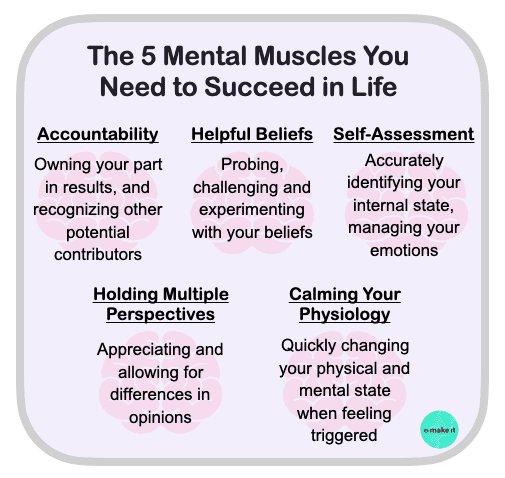When we want more physical fitness, we work our bodies, sometimes focusing on specific muscles, such as our biceps or quadriceps. We can do the same with our mental fitness.
Read Also: Difference Between Fauvism And Expressionism
In my more than 25 years of research as a psychologist, I have discovered that there are five major mental organs that work together to help us strengthen our emotional intelligence, respond to situations more resiliently, building stronger interpersonal relationships and thriving in all parts of life.
Although a large number of successful people have mastered these muscles, most are still not perfect:
Chart: The 5 muscles of mental fitness

The 5 Mental Muscles You Need to Succeed in Life
1. Accountability
You’d be surprised at how many people incorrectly think they’ve already mastered this one. Personal accountability doesn’t have to do with everyday actions like showing up for work or taking your kids to baseball practice on time.
It functions on a much more radical level:
I. You stop blaming other people and circumstances for how you feel or for what has happened.
II. You fully own your part in your results, even while recognizing other potential contributors to what has unfolded.
III. You own exactly what’s yours and you hold others to owning what’s theirs.
2. Helpful beliefs
Most of us think that our beliefs are truths. But they are actually a set of assumptions, which means that we can experiment with them. We can probe them, challenge them and try to think of new ones.
Here are some helpful lenses to adopt:
I. Collaborative lens: This is the “I win when you win” approach. Maybe everyone doesn’t get everything they want, but they all walk away feeling heard and included.
II. Possibility lens: This lens allows you to take a step back and temporarily set aside all perceived obstacles, problems or doubts in order to give yourself the freedom to imagine an ideal outcome.
III. Opportunity lens: Even in times of conflict, you can ask yourself, “How can I find an opportunity in whatever situation I face?”
3. Self-assessment
Can you accurately self-assess your internal state? This is the running commentary in your head, the moods and emotions you feel, and the physical sensations you have, like a knot in your stomach.
Let’s say you’re in a really bad mood. That’s vague. But if you have strong self-assessment muscles, you can say that you’re experiencing a combination of disappointment, anger and anxiety and a pounding headache.
The goal is to get better at managing and regulating your emotions and responses to triggers.
4. Holding multiple perspectives
If you’re like most people, you’re focused on proving that your position is the right one. But when you’re able to see many disparate viewpoints, you have the ability to understand and consider perspectives that aren’t aligned with yours.
When you appreciate and allow for differences in opinions, you can leave a conversation without needing to establish who is right or wrong.
Move beyond the simplicity of black/white, right/wrong and either/or. Practice suspending judgment and embrace the complexity of gray, as well as the potential of the “yet-to-be-known.”
5. Calming your physiology
We underestimate the immense power that we have over our physical state when we are distressed or upset in some way, and how to alter it in general.
The truth is that we can influence our own nervous systems. On the one hand, unhelpfully, we can easily intensify a catabolic state, such as “getting wound up” over something. But helpfully, we can also calm ourselves.
There are many wildly effective techniques, such as breathing exercises and muscle relaxation, that you can use to quickly change your physical state when you feel triggered or threatened.




